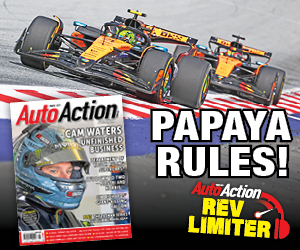INTERVIEW: JEROMY MOORE – JJ MAKES HAY
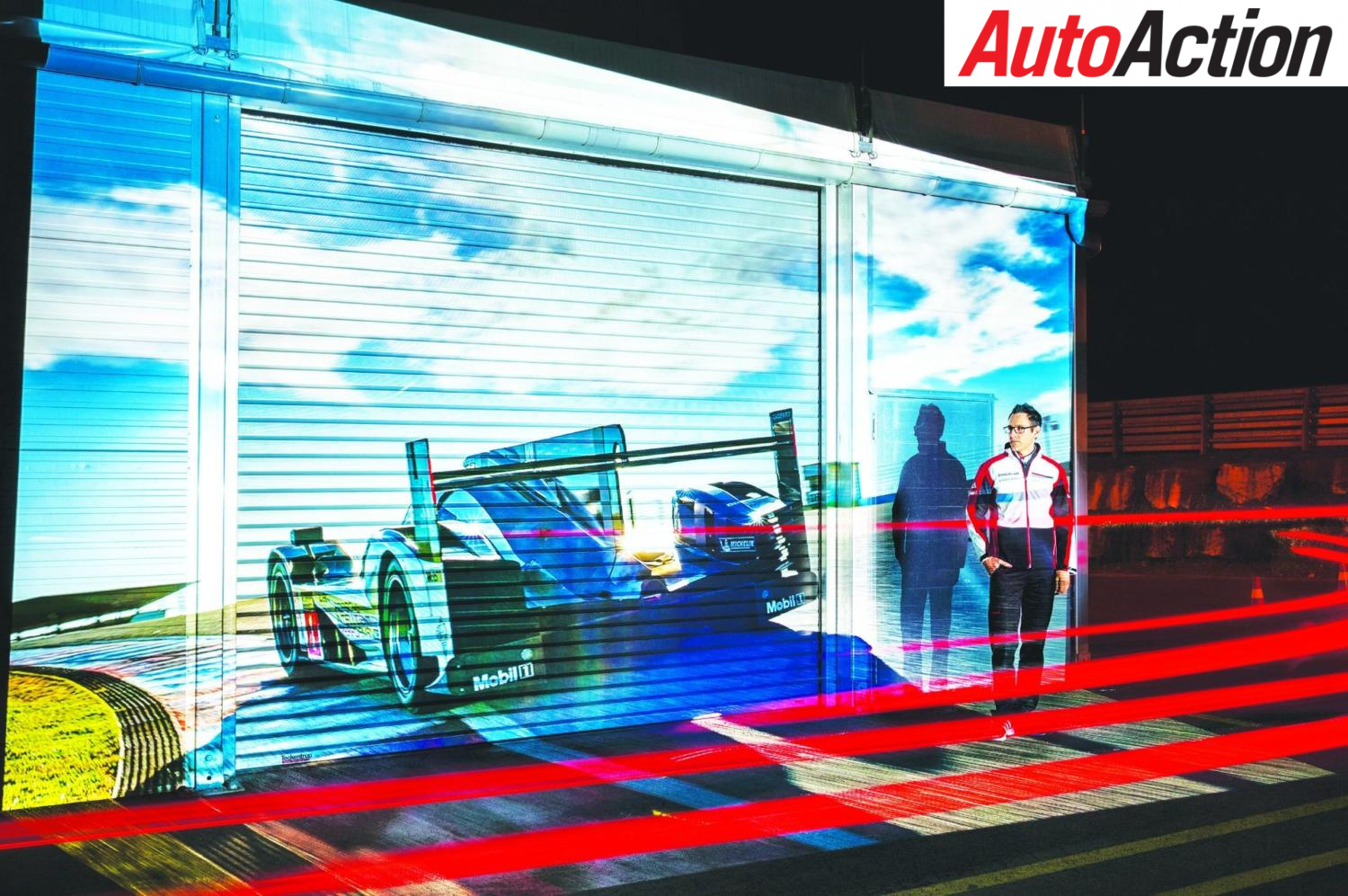
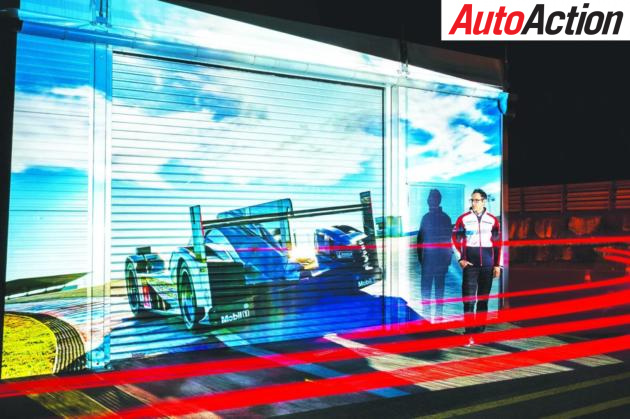
The former Supercars engineer Jeromy Moore now part of the Porsche team in the World Endurance Championship
By PAUL GOVER, News Limited
JEROMY MOORE is a very happy man.
The former Supercars engineer hit all his targets and achieved his dreams in 2016, leading a car crew on the factory Porsche team in the World Endurance Championship, then helping to drive his 919 to victory at Le Mans and then a world championship win.
“It was a fantastic year and one which will be hard to top,” the man known as JJ tells Auto Action.
The former Triple Eight staffer transplanted his wife Michelle and daughter Lola to Stuttgart in Germany in time for the 2015 WEC campaign, after winning a highly prized place at the Porsche factory team where Mark Webber was also one of the pivotal players.
The 37-year-old was promoted to Race Engineer Porsche LMP1 at the beginning of 2016, a job where he co-ordinates and manages everything on one of the Porsche team’s Le Mans cars. That means around 30 people on the road, although there are more than 200 on the project at the factory in Germany.
The Brisbane boy is thoroughly enjoying time in Europe, with everything from sightseeing trips and mountain biking “If it’s not below zero degrees” but gets his biggest kicks from success in racing.
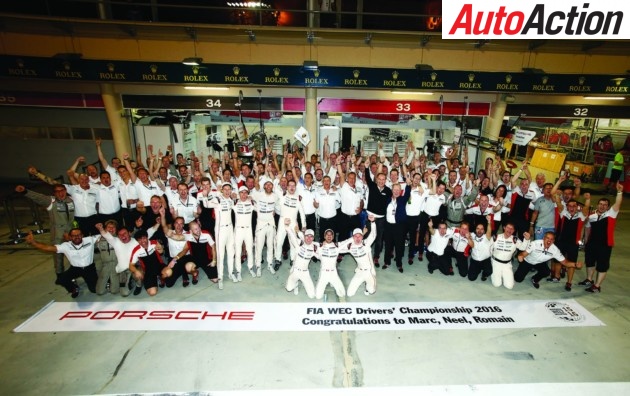
Jeromy Moore part of the WEC Drivers Championship Winning Porsche Team
As he took off for his Christmas holiday break, this is how JJ reflected on the 2016 season:
AA: Le Mans and a world title in one year. How does that feel?
JJ: Strange. I didn’t expect anything like this. To win at the first attempt was unbelievable. It hasn’t really sunk in as we are always focusing on the next event and then next race.
AA: Was it unexpected or just the end result of a good plan?
JJ: Very unexpected. The plan is always to do your best and try to achieve the maximum and you see what you get at the end, but I have been fortunate to be in a great team with the whole package to fight for wins and the great results.
AA: Were you lucky or good at Le Mans, with the leading Toyota failing on the last lap?
JJ: From the sidelines you would say we were completely lucky to win, but actually we were quite unlucky with some of the slow zones that Toyota profited from due to being at the right place at the right time, which put us behind them. We had a fast car and the drivers did a fantastic job, so I wouldn’t say we lucked into it. Of course you have to feel very sorry for the guys at Toyota to have a win within your grasp on the last lap, but I think we pretty much deserved it as much as they did.
AA: Your best time this year?
JJ: Definitely the Le mans weekend. It is such a massive event, from the pre-testing session a week beforehand to the qualifying and all the preparation leading in. The result at the end of the race, going from feeling defeated towards the end to the complete opposite in the elation of crossing the line first, I cannot imagine I will ever experience such an extreme contrast in emotions in such a short time again in my life.
AA: The worst time this year?
JJ: We have had some difficult races but nothing too bad. If anything I would say the worst moment was when we were testing all day where the temperature didn’t get above zero. It’s amazing how difficult simple things like talking or typing on a keyboard become in those temperatures.
AA: How did your three drivers – Neel Janie, Romain Dumas, Marc Lieb – get the job done? Is there one speedster?
JJ: They all have their strengths compared to one another which is a big part of having a successful endurance racing team.
To get the best out of each driver is another level of complexity that is added in this already complex series. They all performed well, particularly in Le Mans. The aim at the start of the season was to finish every race, and this is what was achieved on our car. We were the only car to not spend a single second in the garage during in any of the nine races.
AA: How did you feel about beating Mark Webber, especially in his final year?
JJ: I wouldn’t say we beat him, as he and the guys on Car #1 were a big part of our championship win as they took points away from our competitors at the end of the season. In the WEC it is very team orientated and we all work together, firstly to get the manufacturers championship, and the drivers championship is the icing on the cake.
AA: What is Webber like, compared with other drivers you’ve worked with?
JJ: He is one of the most down-to-earth drivers I have ever met off the track, and on the track he is incredibly focused not only on what he or his teammates are doing but also what the competitors are doing, thinking about what could happen and always pushing the engineers. Like myself he has come from a different background to endurance racing and has some different ideas, which have helped the team globally.
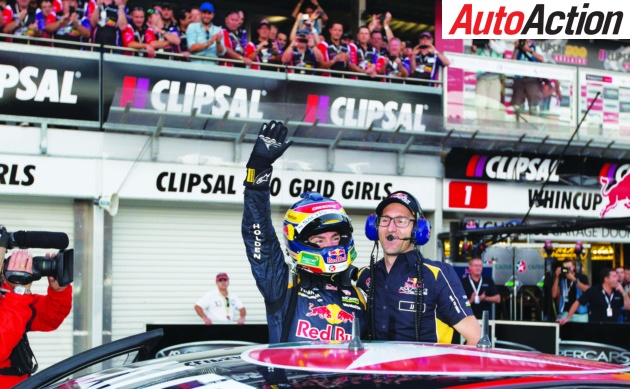
Jeromy Moore with Craig Lowndes at Red Bull Racing in Australia
AA: On that front, why did you leave Triple Eight and Supercars?
JJ: I left 888 because I wanted a new challenge. I felt I had reached the end of the road in my career path there so I decided to look at what else was out there in the world. I certainly enjoyed working there and being a race engineer, especially to Craig Lowndes, but I felt it was time for a change.
AA: How did the job come about?
JJ: Actually from a work colleague from over 10 years ago who moved back to F1. I believe he heard that I was looking for a new career and also knew that my current boss here in Porsche was looking for an engineer. The motorsport world is still quite small so I was quite fortunate for the opportunity.
AA: What was your original Porsche job and how did you get to the new spot on car #2 for 2016?
JJ: I first came across as the performance engineer on car #17, Mark Webber’s car, which was a good step to learn all the systems and how the car and team works as it is a lot to learn coming from Supercars. I must have been doing a good job to then be promoted to race engineer this year on Car #2.
AA: What’s the biggest difference between Supercars and sports cars?
JJ: The two categories couldn’t be further apart in terms of their philosophy. Supercars is a lower-cost, highly constrained series to create close racing. LMP1 is really almost a proving ground for manufacturers to develop and display their technology, particularly in the 919, where the hybrid powertrain technology finds its way back into future sports cars.
But to look purely at the cars, to compare the major areas where the cars differ greatly, would be the aerodynamics and of course the powertrain philosophy. An LMP1 car, depending on the aero configuration chosen, can have four times the downforce of a Supercar whilst weighing just over half the weight. Also, the powertrain of the Porsche LMP1 car has close to 1000 horsepower from a combination of an electric motor on the front axle and a 2-litre turbo 4-cylinder driving the rear axle, compared to just over 600 horsepower, whilst using one-third the fuel. It is a bit unfair to compare directly.
AA: Do the same basics apply or is it massively more complicated?
JJ: The same basics apply in that there are four tyres touching the ground, but you look for totally different tools to make the car go faster. The aerodynamics and how you deploy the maximum electrical energy per lap are the first order of priority, differentials front and rear, temporary 4WD, traction control. LMP1s are extremely sophisticated yet have to run reliably for 24 hours non-stop.
AA: How big a challenge is the change?
JJ: It was such an enormous challenge. Totally different car, different strategies with the six-hour and, of course, 24-hour race. Testing 40-plus days a year, endurance testing all through the night, working with many more people from all different backgrounds. As well as the away-from-work difficulties of living in a different country with a different language away from all our family and friends. The first year was quite hard, but gradually you adapt to the new environment and understand how things work and get on with it.
AA: What’s it like working for Porsche? What’s your company car?
JJ: Porsche is an amazing company to work for. They really look after their employees and to be part of the factory Porsche team, which has won 18 Le Mans 24-hours is pretty much a dream come true. The car at the moment is a 911. Slightly on the limit to fit two adults and a child in for long trips and a mountain bike, but not impossible. Certainly an amazing car to drive and an experience which would have been out of reach had I not worked here at Porsche.
AA: Were you surprised by the Audi withdrawal and how does it affect your team?
JJ: I was very surprised as they have been part of the Le Mans furniture for many years now. They will be missed not only by the fans, but by all competitors as they have been the benchmark and we have had fantastic battles on track.
AA: What will you be doing in 2017? And what’s the long-term plan?
JJ: No real long-term plans other than to keep involved in motorsport for as long as I can. I am one of the lucky few who can earn a living doing something I love. So just enjoy what I am doing here and see what happens. 2017 will be hopefully fighting for more victories in the #1 Porsche
AA: So you’ve already started testing for next year? What will change?
JJ: There are always new developments on the car each year to improve the performance. Not much actually stays the same year-to-year, so it would be easier to say what won’t change. The battle with Toyota will be closer than ever as they have had a year of learning their new powertrain after converging to a similar solution to the Porsche 919, so I am sure they will refine their package and improve so we always need to keep developing to stay at the front.
AA: How long do you see yourself at Porsche? Are you eventually aiming for F1?
JJ: At this point in time I am happy here. F1 has always been something I dreamt about from a young age, but I thought it would be out of reach when I was in Supercars back in Australia. It is, of course, just a leap across the channel now, but I don’t have a specific goal to get into F1 at the moment. For sure it would be another great challenge.
AA: Do you think you will ever come back to Supercars, or even Australia?
JJ: I do see myself coming back to Australia at some point in time. Supercars is still an interesting category with a good balance of engineering interest and close racing and, of course, that is where all my family are.
Luckily enough I get family members visiting from time to time to bring rations of Vegemite to stay sane. So maybe I will find my way back home sometime sooner or later.
AA: What’s the message to Supercars from your success?
JJ: I am very grateful for working in Supercars and especially with 888, as it meant I could learn a lot of the many aspects of motorsport. Not only being a race engineer, but to design the car, watch parts being manufactured, then bolt them together yourself, fit them to the car and then go and test and race them. In other categories around the world it is much more specialised, so I think without this education I couldn’t have come across the other side of the world and done as well as I have so far
AA: What about some advice for engineers looking to go overseas?
JJ: Give it a go. If anything, just to experience how things operate across the globe. Not only in your professional life, but also living in a different country, is a great experience.
AA: And drivers?
JJ: For the kids starting off in karts there is, sadly, not much choice than to go overseas if their aspirations are professional open-wheel racing. We have seen the great success of Mark Webber and now Daniel Ricciardo, who have shown Aussies can certainly perform at the highest level.
For the guys currently in Supercars there is really no excuse as, generally, they would just fly in and fly out of races. As we have seen with SvG, you can be very successful and I am sure he has benefited from driving many different cars and also working with different engineers
AA: A final message to Roland Dane, your boss in Supercars who also turned 60 last year?
JJ: A big year for RD turning 60 and becoming an Aussie citizen. Congrats on both. Thanks for putting up with me for 11-plus years and giving me the nudge out the door to venture out into the great big world.
Pick up the latest issue of Auto Action magazine for our most recent interviews. Also follow us on social media Facebook, Twitter and Instagram news between issues.

